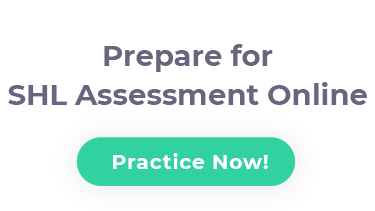SHL Deductive Reasoning Test Online Preparation: Free Practice Questions & Tips [2025]

What Is the SHL Deductive Reasoning Test?
The SHL Deductive Reasoning Test is an assessment for employers to evaluate a candidate’s logical thinking skills during the hiring process. Test takers will need to consider general ideas to reach a specific conclusion.
There are different question types included in the SHL Deductive Reasoning Test. Some of these include:
- Analyzing given scenarios
- Identifying the strengths and weaknesses of an argument
- Drawing conclusions from the presented data
In addition to the different question types, SHL also offers three versions of their Deductive Reasoning Test. These include an interactive format and two non-interactive versions.
Employers from all industries want their employees to be able to think critically and logically. Therefore, no matter what position you are applying for, there is a good chance you may take a deductive reasoning test.
Verify G+ Interactive Format
The interactive reasoning version of the SHL Deductive Reasoning Test is unique in that it allows the test taker to drag and drop answers, rank answer choices, and arrange items on the screen instead of the classic multiple-choice test.
This test consists of 12 questions, and you will have 1.5 minutes to answer each one for a total test time of 18 minutes. Questions on this test will be more detailed than a typical multiple-choice assessment. Some examples include scheduling a calendar, arranging meeting rooms, and ranking items based on specific criteria.
Verify G+ Interactive Sample Question
Below is an example of a question that you may see on the SHL Deductive Reasoning interactive test:
Question:
The development team has a busy day ahead of them. Each team member is at their desk unless they have another activity. Conference Room B is reserved for in-person meetings, and Conference Room A is used for scheduled phone calls. The break room is where employees each lunch, and the courtyard is where employees go to take a break. Where are all the listed employees at 3:00 pm?
| Abby |
In-person team meeting |
1:00 pm – 3:30 pm |
| Bonnie |
Lunch |
1:00 pm – 2:00 pm |
| Carla |
Phone call with customer |
2:30 pm – 3:30 pm |
| Dana |
Break |
2:45 pm – 3:15 pm |
| Elise |
In-person team meeting |
3:30 pm – 4:30 pm |

Answer:
During the actual test, you will need to drag and drop an avatar that represents each person on the team into the room they will be in at 3:00 pm. Where each person will be is listed below:
| Abby |
Conference Room B |
| Bonnie |
Desks |
| Carla |
Conference Room A |
| Dana |
Courtyard |
| Elise |
Desks |
Verify G+ Non-Interactive Format
The SHL Verify G+ non-interactive format is a multiple-choice assessment. You will have 20 minutes to answer 18 questions, and each question will have four or five possible answers listed that you must choose the correct answer from.
You will encounter different question types on this test, including:
- Detailed question about presented data
- Identifying which statement must be true or false after a given paragraph
- Identifying which assumption you can make following a given paragraph
Verify G+ Non-Interactive Sample Question
Below is an example of a question that you may encounter on the Verify G+ Non-Interactive SHL Deductive Reasoning Test:
Question:
Sally and her sisters Ronda, Tessa, and Gabby are all in different grades but go to the same middle school. Their middle school is 5th through 8th grade. Tessa is older than Gabby, and Rhonda is younger than Sally. Sally is excited to start high school next year, and Rhonda is excited to be out of elementary school this year. Tessa is the second oldest sister.
Which statement must be true?
- Tessa is in 5th grade.
- Gabby is in 6th grade.
- Sally is in 7th grade.
- Rhonda is in 8th grade.
Answer:
Choice B: Gabby is in 6th grade.
CEB’s SHL Deductive Reasoning Test
The last test format you may encounter is the SHL Deductive Reasoning Test. This test consists of 18 questions that you’ll have 20 minutes to answer. This format is an older version of the Deductive Reasoning Test but is still common among several companies.
During this test, you will receive several statements that you must assume to be true. Then, you will get four or five answer choices, and you must identify which of these statements must be true or false based on the given information.
CEB’s SHL Deductive Reasoning Sample Questions
Below are a few examples of questions you may encounter on the SHL Deductive Reasoning Test:
Question 1:
- All cars are red, blue, or green.
- Only red cars are bigger than blue cars.
- Green cars are always the smallest cars.
Which statement must be true?
- Red cars are the largest cars.
- All blue cars are smaller than green cars.
- Green cars are the largest cars.
- Blue cars are larger than yellow cars.
- None of the above.
Answer 1:
Choice A: Red cars are the largest cars.
Question 2:
- Apples are red, green, or yellow.
- Green apples cost more than red apples but less than yellow apples.
- Yellow apples cost $3.00 more than red apples.
- Red apples cost $0.50 each.
Which statement must be true?
- Yellow apples cost $2.50
- Green apples cost $2.75
- Four red apples cost the same as one yellow.
- Green apples cost $0.25
- None of the above.
Answer 2:
Choice B: Green apples cost $2.75.
SHL Deductive Reasoning Test Scoring
Like all SHL assessments, the SHL Deductive Reasoning Test is scored on a curve. This means that your raw score will be compared to other applicants, and then you will be given a rank based on how well you did in comparison to other test-takers.
After you complete your test, you will receive an assessment report that gives you a ranking of A through E, with the A rank reserved for higher scores and the E rank for those who did not do as well compared to other candidates.
Because your score rank will depend on your percentile, there is not an exact raw score that will ensure your success. However, candidates that score in category A or B will likely graduate to the next stage of the recruitment process.
It is important to note that this curved grading approach does not mean that it is easier to do well on this test. If the average candidate receives a raw score of 75%, you will need to have a raw score much higher than that to be classified in the A or B tier. Therefore, it is essential to do as well as you can on the test and strive for as high a raw score as possible.
How to Prepare for the SHL Deductive Reasoning Test?
The best way to prepare for the SHL Deductive Reasoning Test and ensure that you receive a high score is to study ahead of time. The question types on this test are unique, and they take some getting used to. The best way to gain exposure to the unique formats of the SHL Deductive Reasoning Tests is through practice tests.
It would be best to study for the specific format you will take since all three present different question types. You can easily find full-length sample tests for each format, as well as individual example questions and test-taking tips online.
Taking the time to prepare for the SHL Deductive Reasoning Test adequately will significantly increase your chances of doing better than your peers and moving on to the next stage of the hiring process.
Disclaimer: SHL® is a registered trademark of SHL Group Ltd. SHL Group Ltd is not affiliated with Practice4Me or this website. This website solely provides information on how to prepare for job psychometric tests.


